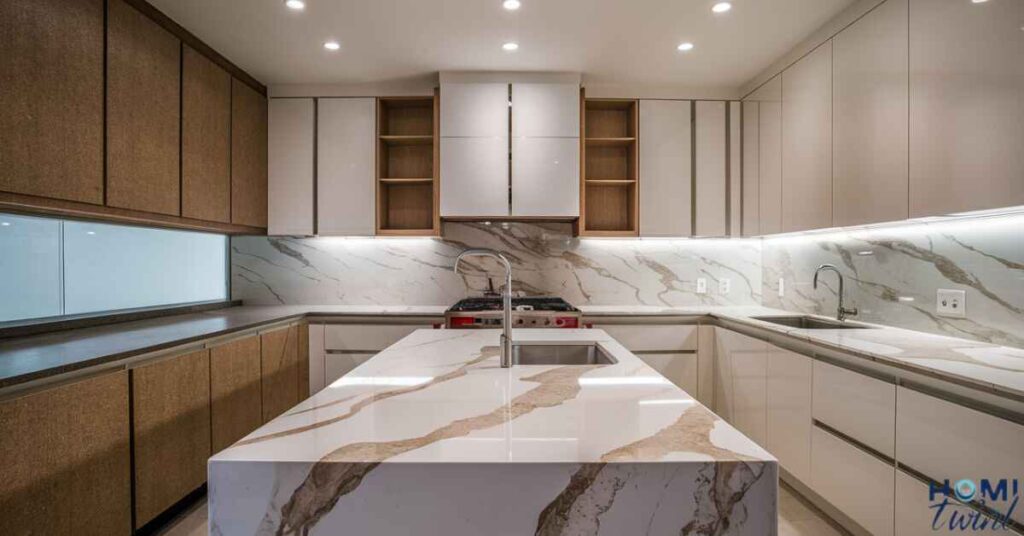Considering a kitchen update? Wondering if you can refresh your countertops without overhauling your cabinets? This dilemma is common among homeowners seeking a cost-effective makeover.
While a full remodel involves extensive changes, a countertop replacement offers a middle ground, providing a fresh aesthetic without disrupting the entire kitchen layout.
Understanding the process, from assessing cabinet strength to selecting suitable materials, is crucial.
Let’s delve into the possibilities and practicalities of replacing countertops without replacing cabinets.
Why You Might Want to Keep Existing Cabinets
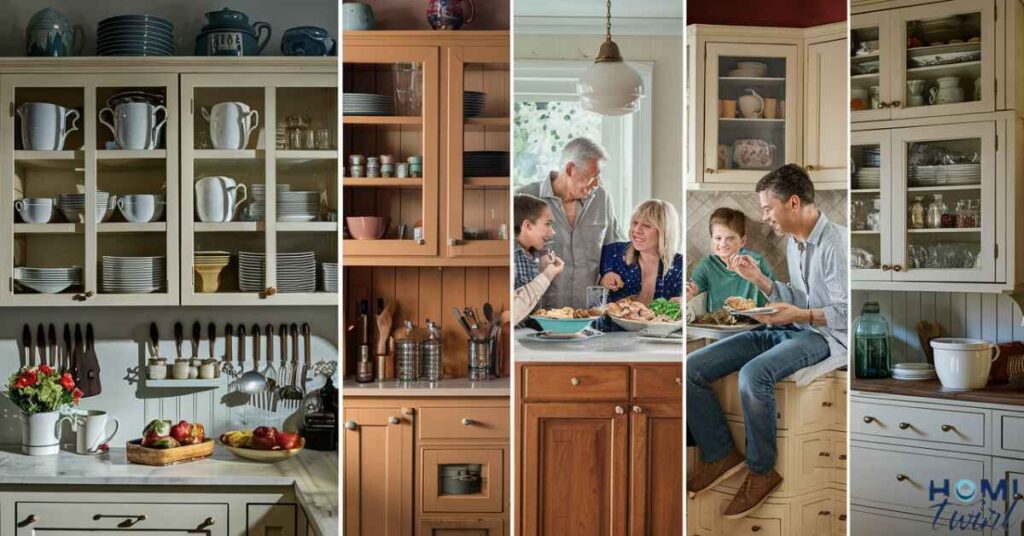
Choosing to keep your existing cabinets during a kitchen update can provide several benefits.
- Cost Savings: Replacing cabinets can be one of the most expensive aspects of a kitchen remodel. By keeping your current cabinets and focusing solely on replacing the countertops, you can achieve a fresh, updated look at a fraction of the cost.
- Avoiding Disruption: A full kitchen renovation often involves significant disruption to your daily routine, as appliances and workspaces may be inaccessible for an extended period. By keeping your cabinets in place, the process is typically faster and less disruptive.
- Preserving Desired Layout: If you’re happy with the current layout of your kitchen and the functionality it provides, replacing just the countertops allows you to maintain the existing design while still benefiting from an aesthetic upgrade.
Read This Blog: CAN YOU PUT CABINETS ON TOP OF LVP
Things to Consider Before Keeping Your Current Cabinets
While keeping your existing cabinets during a countertop replacement can be a cost-effective and convenient option, there are several factors to consider.
- Cabinet Condition: Your cabinets must be in good structural condition and able to support the weight of new countertop materials, especially if you’re considering heavier options like Weak or damaged cabinets may not be suitable for supporting the added weight, potentially leading to issues down the line.
- Floor Stability: If you’re transitioning from lightweight countertop materials like laminate to heavier stone options, it’s important to ensure your flooring can handle the increased weight without sagging or denting over time.
- Sink Replacement: Depending on the condition of your existing sink and its compatibility with the new countertops, you may need to as well. This can impact the countertop cutout and faucet configuration, potentially adding to the overall project cost.
- Backsplash Compatibility: Consider whether your new countertop material will complement or clash with your existing backsplash. If there’s a mismatch, you may need to factor in the cost of updating the backsplash as well.
- Professional Assessment: It’s crucial to have a professional and provide guidance on whether they can safely support the desired countertop material. This assessment can help you make an informed decision and avoid potential issues down the line.
Case Study: The Johnsons’ Kitchen Refresh
The Johnson family wanted to update their kitchen without undergoing a full remodel. After consulting with a professional contractor, they decided to keep their existing cabinets, which were in excellent condition, and focus on replacing their outdated laminate countertops with beautiful new quartz surfaces.
The contractor carefully assessed the cabinets’ strength and determined that they could support the weight of the quartz countertops. The project was completed within a week, with minimal disruption to the family’s daily routine. The new countertops transformed the space, providing a sleek and modern look that perfectly complemented the existing cabinets and backsplash.
Where Beauty and Function Meet
When considering a countertop replacement project, it’s essential to strike a balance between aesthetic appeal and practical functionality. This is where consulting with professionals like a reputable home remodeling service in Southeast PA, can be invaluable.
Also Read This Blog: CAN YOU PAINT HINGES ON CABINETS
With over 100 years of experience, Longacre Company’s team of experts can guide you through the process of ensuring that both beauty and functionality are prioritized. Their services include.
- Assessing Cabinet Condition: Longacre Company’s professionals will carefully evaluate the strength and stability of your existing cabinets to determine if they can support the desired countertop material without compromising safety or longevity.
- Design Consultation: Their team will work with you to understand your vision and preferences, helping you select the perfect countertop material, color, and style to complement your existing kitchen elements.
- Seamless Installation: Longacre Company’s skilled installers are trained to handle the ensuring a smooth and efficient installation process with minimal disruption to your household.
By partnering with a reputable company like Longacre, you can feel confident that your countertop replacement project will be executed with precision, attention to detail, and a commitment to delivering a beautiful and functional result.
Can You Put New Countertops on Old Cabinets? Absolutely!
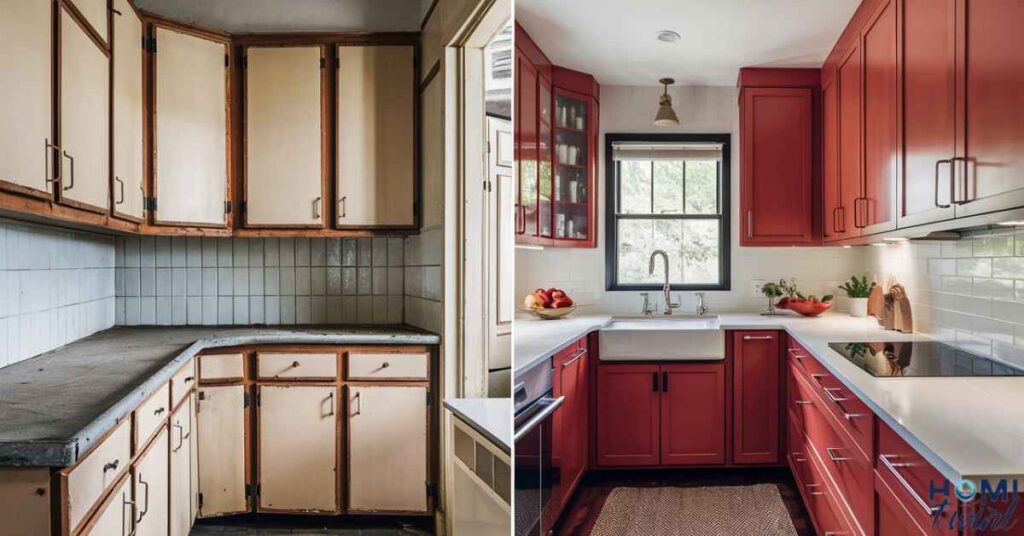
The short answer is yes, you can absolutely if the existing cabinetry is in good condition and can support the weight of the new material. However, there are a few important considerations.
- Removal Process: Proper removal of the old countertops is crucial to avoid damaging the cabinets. Some materials, like laminates, may be screwed in place and relatively easy to remove, while others, like require more careful handling to prevent chipping or cracking the surrounding cabinetry.
- Cabinet Strength: As mentioned earlier, your existing cabinets must be strong enough to support the weight of the new countertop material you’ve selected. Heavier options like granite or quartz may require reinforcement or additional support structures.
- Floor Stability: If you’re transitioning from lightweight countertops to heavier materials like stone, ensure that your floor can handle the additional weight without sagging or denting over time.
- Sink Replacement: Depending on the condition of your existing sink and its compatibility with the new countertops, you may need to factor in the cost and logistics of as well.
- Backsplash Compatibility: Evaluate whether your new countertop material will complement or clash with your existing backsplash. If there’s a mismatch, you may need to consider updating the backsplash as well.
It’s always advisable to consult with a professional contractor or countertop installer to assess the feasibility and potential challenges of putting new countertops on your existing cabinets. Their expertise can help you avoid costly mistakes and ensure a successful, long-lasting installation.
Can You Replace Countertop Without Replacing Sink?
In many cases, homeowners wonder whether they can as well. The answer depends on a few factors:
- Sink Condition: If your existing sink is in good condition and compatible with the new countertop material, it may be possible to keep it in place during the countertop replacement.
- Sink Type: The type of sink you have can impact the feasibility of reusing it. which are installed beneath the countertop surface, may be more challenging to reuse without damaging the surrounding area during the removal process. On the other hand, which rest on top of the countertop, can often be more easily removed and reinstalled with the new counters.
- Faucet Configuration: If you plan to keep your existing sink, ensure that the new countertop cutout and faucet configuration will accommodate the plumbing
Case Study: The Smiths’ Sink Dilemma
When the Smith family decided to replace their outdated laminate countertops with sleek granite surfaces, they initially planned to keep their existing undermount sink. However, upon closer inspection, the contractor noticed that the sink was showing signs of wear and tear, with a few minor cracks around the edges.
Considering the investment they were making in high-quality granite countertops, the contractor recommended replacing the sink as well. This would not only ensure a seamless, integrated look but also prevent potential water damage or leaks from the compromised sink in the future.
The Smiths took the contractor’s advice and opted for a new undermount sink that complemented the stunning granite countertops. While it added to the overall project cost, the peace of mind and cohesive aesthetic made it a worthwhile decision for their dream kitchen.
Can You Replace Granite Countertops Without Damaging Cabinets?
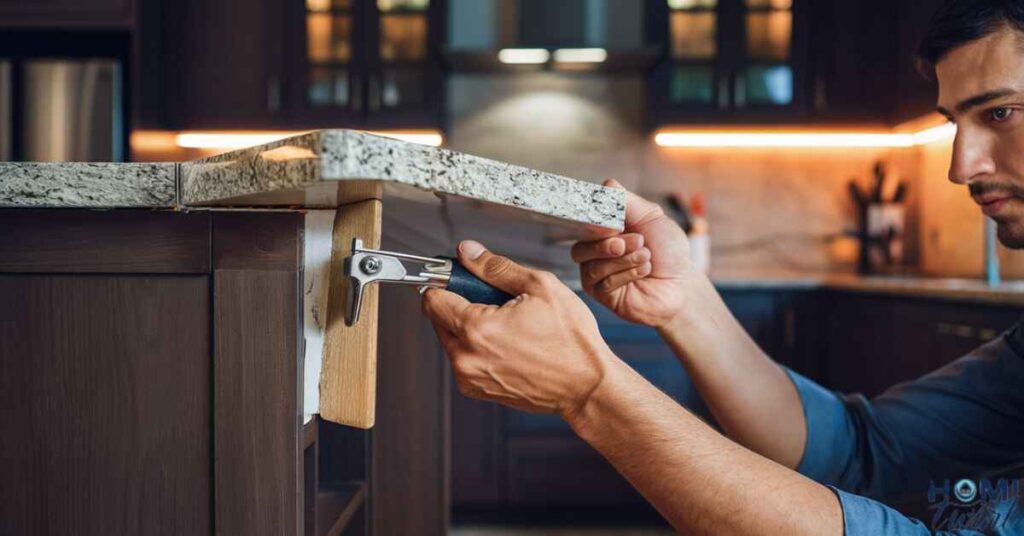
are a popular choice for many homeowners due to their durability, heat resistance, and luxurious appearance. However, their weight and thickness can raise concerns about whether they can be installed without causing damage to existing cabinets.
The good news is that yes, it is generally possible to provide the installation is handled by experienced professionals. Here are a few key considerations.
- Removal Process: Granite slabs are typically adhered to the cabinets using silicone or construction adhesive. Careful removal by trained installers is crucial to avoid chipping or cracking the countertop material or damaging the cabinets during the process.
- Cabinet Reinforcement: Depending on the condition and strength of your existing cabinets, reinforcement or additional support structures may be necessary to accommodate the weight of the new granite countertops.
- Professional Installation: Experienced countertop installers have the specialized tools and techniques required to safely lift, transport, and secure granite slabs onto your cabinets without causing any damage.
It’s important to note that attempting to remove or install granite countertops yourself can be risky and may result in costly mistakes or injuries. Partnering with a reputable countertop installation company is highly recommended to ensure a seamless and damage-free process.
Who Discards My Old Countertops?
Once your new countertops are installed, you’ll need to decide what to do with the old ones. In most cases, they will be responsible for removing and discarding the old countertop material.
However, you may have other options if you’re interested in repurposing or recycling your old countertops:
- Reuse for Other Projects: Depending on the material and condition of your old countertops, you may be able to repurpose them for other DIY projects, such as creating a custom tabletop, shelving, or even outdoor furniture.
- Sell or Donate: If your old countertops are still in good condition, you may be able to sell them to someone else who can use them or donate them to a local organization or charity that accepts such materials.
- Recycle: Many countertop materials, particularly solid surfaces like granite or quartz, can be recycled. Check with your local recycling center or waste management company to see if they accept these materials.
- Creative Reuse: For stone countertops like granite or marble, you could consider breaking them into smaller pieces and using them in mosaic art projects, pathway pavers, or even decorative accents in your garden.
If you do plan to reuse or recycle your old countertops, discuss the logistics with your installation crew or contractor beforehand. They may be able to provide helpful advice or even assist with the removal and transportation process.
Pro Tip: Proper Disposal of Old Countertops
If you choose to discard your old countertops, it’s important to do so responsibly and in accordance with local regulations. Some materials, such as laminate or solid surface countertops, may need to be disposed of through specialized channels or facilities. Your contractor or local waste management authority can provide guidance on the proper disposal methods for your specific countertop material.
The Bottom Line
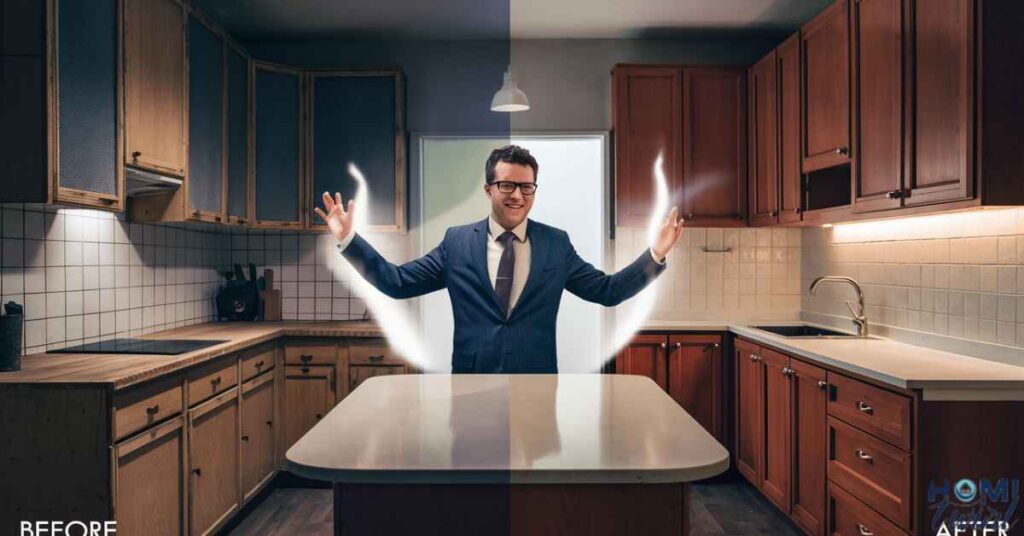
Replacing your kitchen countertops without replacing the cabinets can be a practical and cost-effective solution for homeowners seeking a fresh, updated look without undergoing a full-scale kitchen renovation. However, there are several factors to consider, such as the condition and strength of your existing cabinets, the compatibility of the new countertop material, and the potential need to replace other elements like the sink or backsplash.
By consulting with professionals like those at, you can receive expert guidance and ensure a seamless installation process. Their team will assess your cabinets, provide customized recommendations, and handle the practical details with minimal disruption to your household.
Remember, while replacing just the countertops is possible in many cases, it’s essential to have a thorough evaluation of your existing kitchen elements to avoid potential issues or costly mistakes down the line. With the right approach and professional assistance, you can achieve the stunning, functional kitchen of your dreams without the need for a complete overhaul.
Cost Calculator
To help you estimate the potential costs of your countertop replacement project, we’ve developed a handy. Simply input the details of your kitchen, such as square footage, desired countertop material, and any additional services required (like sink replacement or backsplash updates), and the calculator will provide you with a rough estimate of the total project cost.
This tool can be a valuable resource in helping you plan and budget for your kitchen update, ensuring that you have a realistic understanding of the investment required to achieve your desired results.
Longacre Company’s Expertise and Services
A reputable home remodeling service in Southeast PA with over 100 years of experience, offers expertise and services to guide homeowners through the process of .One crucial aspect Longacre Company considers is the condition of the existing cabinets. They understand that the cabinets must be strong enough to support the weight of new countertop materials like.
Longacre Company’s team of professionals is skilled at assessing the possibility of installing new kitchen counters on current cabinetry. They take into account factors such as the strength of the old cabinets, the weight of the new countertops, and the overall design vision of the homeowner. Their services ensure that the installation process proceeds smoothly with minimal disruption to the household.
Practical Details on Countertop Replacement

Replacing countertops without damaging the cabinets involves several key steps.
Preparation
Longacre Company’s team begins by clearing the kitchen area, including removing utensils, cookware, and appliances, to provide easy access to the countertops. It’s also important to ensure the cabinets are level to prevent potential issues with the installation of new countertops. Materials like granite or marble could crack if the surface isn’t even.
Removal Process
The installers carefully remove any adhesive holding the old countertops to the cabinets. If the countertops are screwed into the cabinets from underneath, they use a screwdriver to detach them. For countertops held in place with brackets, nails, or additional adhesive, extra care is taken. The installers gently pry them up from under the rim, working from one end to the other to avoid damaging the cabinets.
Installation of New Countertops
Once the old countertops are removed, the new countertops can be installed. It’s crucial to handle materials like granite or quartz with care due to their weight and the risk of damage during installation. Ensuring the cabinets can support the weight of the new countertops is a critical step in the preparation phase.
Frequently Asked Question
Can you put new countertops on old cabinets?
Yes, it’s possible. However, ensure cabinets can support the new material’s weight, and consult professionals for safe removal of old countertops.
Can you replace countertops without replacing the sink?
Yes, you can. But consider the sink’s condition; it may need upgrading, especially if it affects faucet configuration or if you have an under-mount sink.
Can you replace granite countertops without damaging cabinets?
Yes, with proper installation by experienced professionals, it’s feasible to replace granite countertops without harming the cabinets.
Who discards the old countertops?
Usually, installers handle removal and disposal. Alternatively, you can enlist a removal company or explore creative recycling options for old countertops.
Do cabinets need replacing if only replacing countertops?
Not necessarily, but weak or deteriorated cabinets should be assessed for replacement to support the new countertop’s weight.
What factors should be considered before keeping current cabinets?
Evaluate cabinet strength, compatibility with new countertops, and future renovation plans to determine if keeping them is advisable.
How does countertop replacement affect kitchen functionality?
Countertop replacement offers a significant aesthetic update with minimal disruption to kitchen functionality, making it a popular choice for homeowners seeking a refresh.
Conclusion
replacing countertops without replacing cabinets offers a viable solution for homeowners seeking a kitchen update without the expense and disruption of a full remodel.
This approach provides a middle ground, allowing for significant aesthetic improvements while preserving the existing layout and functionality. By carefully assessing cabinet strength, selecting suitable materials, and enlisting professional installation services, homeowners can achieve a fresh look without compromising structural integrity.
Furthermore, considerations such as sink compatibility and future renovation plans should be factored in to ensure a cohesive and sustainable update. Ultimately, with proper planning and execution, replacing countertops while retaining cabinets can breathe new life into a kitchen space, providing both visual appeal and practical functionality for years to come.

